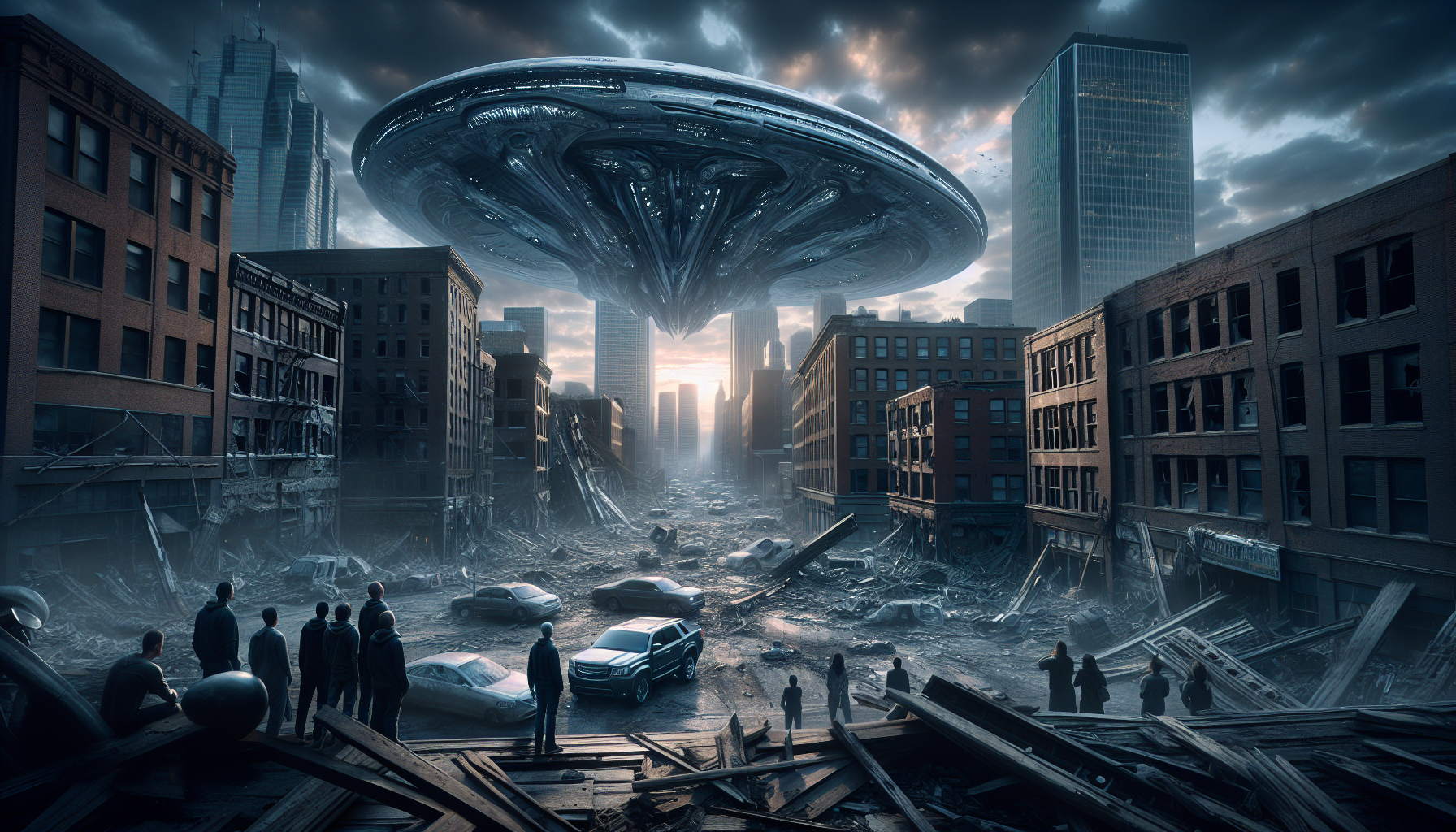In the annals of science fiction literature, few works have captured the collective imagination as powerfully as H.G. Wells’ “The War of the Worlds.” First published in 1898, this seminal novel introduced readers to the terrifying notion of an alien invasion, painting a vivid picture of Martian invaders wreaking havoc on Earth. While the story itself is a work of fiction, it has sparked countless debates and theories about the possibility of extraterrestrial life and their potential impact on our world. But beyond the gripping narrative and thrilling confrontations, what if there is more to this tale than meets the eye? 🤔 What if the novel’s depiction of an alien invasion holds deeper truths and insights into human nature, societal fears, and even historical events? In this article, we will delve into the enigmatic layers of “The War of the Worlds,” exploring the shocking truths and hidden messages that continue to resonate over a century after its publication.
The Origins of “The War of the Worlds”
Published in 1898, H.G. Wells’ “The War of the Worlds” stands as a pioneering work in the science fiction genre, captivating readers with its thrilling narrative and imaginative depiction of an alien invasion. The novel is set in the late 19th century and describes an apocalyptic scenario where Martians invade Earth, wreaking havoc and inciting fear in the human population. Wells’ work is often heralded for its innovative storytelling, weaving together social commentary with speculative fiction.
The inception of this masterpiece can be traced back to Wells’ interest in the scientific advancements of his time, especially the growing curiosity about life on Mars. The late 19th century was a period of rapid scientific discovery and technological progress, igniting public imagination about the possibilities of life beyond Earth. As telescopes became more advanced, astronomers like Percival Lowell popularized the idea of Martian canals, sparking widespread speculation and debate. Wells, inspired by these discussions and the prevailing curiosity, crafted a story that explored the hypothetical consequences of contact with an extraterrestrial civilization.
Wells’ narrative goes beyond mere entertainment; it serves as a mirror reflecting the societal anxieties of his era. The novel subtly critiques imperialism, a dominant force at the time, by portraying humans as the subjugated, drawing parallels between the Martian invasion and European colonialism. This theme resonated with readers, offering a fresh perspective on humanity’s role in the universe and its moral implications. The novel’s impact was further amplified by its serialization in magazines, making it accessible to a broad audience and cementing its place in literary history.
Table: Key Events in “The War of the Worlds”
| Event | Significance |
|---|---|
| The Arrival of the Martians | Marks the beginning of the invasion and sets the stage for the conflict. |
| The Destruction of Woking | Demonstrates the power and technological superiority of the Martians. |
| The Collapse of London | Symbolizes the chaos and helplessness faced by humans against the invaders. |
| The Unexpected Defeat of the Martians | Reveals the vulnerability of the Martians to Earth’s bacteria, offering a surprising resolution. |
The Cultural Impact of “The War of the Worlds”
Wells’ novel has left an indelible mark on popular culture, influencing various media, from films and radio broadcasts to television series and literature. One of the most notable adaptations is Orson Welles’ 1938 radio dramatization, which famously caused public panic due to its realistic portrayal of the invasion. Broadcast as a series of news bulletins, many listeners believed that an actual alien invasion was underway, highlighting the power of media in shaping public perception.
In the realm of cinema, “The War of the Worlds” has been adapted multiple times, each iteration reflecting the era’s societal concerns. The 1953 film adaptation, for instance, mirrored Cold War anxieties, using the Martian threat as an allegory for nuclear annihilation. More recently, the 2005 adaptation directed by Steven Spielberg brought the story into the 21st century, emphasizing themes of family and survival in a post-9/11 world. These adaptations not only kept the story relevant but also showcased its versatility in addressing contemporary issues.
Beyond adaptations, Wells’ novel has inspired countless works in the science fiction genre, influencing writers and creators such as Arthur C. Clarke, Isaac Asimov, and even filmmakers like George Lucas. The concept of alien invasions has become a staple in sci-fi, with “The War of the Worlds” serving as a foundational text that paved the way for future explorations of this theme. As such, the novel’s legacy extends far beyond its initial publication, continuing to captivate and inspire new generations.
The Science Behind the Story
At the heart of “The War of the Worlds” lies a fascination with the possibilities of extraterrestrial life and the potential consequences of interplanetary encounters. Wells, drawing on the scientific knowledge of his time, crafted a narrative that, while fictional, was grounded in plausible scientific concepts. The Martians, for instance, are depicted as technologically advanced beings, utilizing heat rays and mechanical tripods—ideas that, although speculative, were inspired by contemporary scientific thought.
One of the most intriguing aspects of the novel is its exploration of the biological differences between humans and Martians. Wells imagines the Martians as highly evolved creatures, having adapted to the harsh conditions of their planet. This idea reflects the growing understanding of evolution and natural selection during Wells’ time, popularized by Charles Darwin’s theories. The novel suggests that technological prowess does not equate to invulnerability, as the Martians ultimately succumb to Earth’s bacteria, a plot twist that emphasizes the importance of biological adaptation.
The novel also touches on the theme of interspecies conflict, raising ethical questions about humanity’s place in the universe. By positioning humans as the invaded rather than the invaders, Wells challenges readers to reconsider their assumptions about superiority and dominance. This perspective shift invites contemplation about the moral implications of colonization and the responsibility that comes with technological advancement.
Watch the Video: The Science of “The War of the Worlds”
For a deeper understanding of the scientific concepts explored in Wells’ novel, watch this insightful video from the SciShow channel: The Science of “The War of the Worlds”. This video delves into the real-world scientific ideas that inspired Wells and how they have evolved over time.
The Enduring Legacy of “The War of the Worlds”
More than a century after its publication, “The War of the Worlds” continues to captivate audiences with its gripping narrative and thought-provoking themes. The novel’s enduring appeal lies in its ability to resonate with readers across generations, offering a lens through which to explore humanity’s fears, hopes, and aspirations. By blending scientific speculation with social commentary, Wells crafted a story that remains relevant and impactful, inspiring countless adaptations and reinterpretations.
The novel’s legacy is also evident in its influence on subsequent works of fiction, both within and beyond the science fiction genre. Its exploration of alien encounters has become a staple theme, inspiring a myriad of stories that delve into the possibilities of life beyond Earth. From blockbuster films to literary masterpieces, the shadow of “The War of the Worlds” looms large, a testament to its timeless nature and universal appeal.
As we continue to explore the cosmos and search for signs of extraterrestrial life, “The War of the Worlds” serves as a reminder of the potential challenges and ethical dilemmas that such discoveries may bring. Its narrative invites reflection on our own world, urging us to consider the implications of our actions and the responsibilities we bear as stewards of our planet. In this way, Wells’ novel remains as relevant today as it was at the time of its creation, a beacon of speculative fiction that challenges us to envision the future while contemplating the present.
- Explore the historical context of “The War of the Worlds” and its impact on literature.
- Examine the scientific ideas that inspired Wells’ vision of an alien invasion.
- Discover how the novel continues to influence popular culture and media.

Conclusion
In concluding our exploration of “Unveiling The War of the Worlds: The Shocking Truth Behind the Infamous Alien Invasion,” it is essential to reflect on the captivating journey we have undertaken through the realms of fiction, media influence, and societal impact. This article has delved into the layers of H.G. Wells’ classic tale, not only as a piece of science fiction literature but as a cultural phenomenon that has reverberated through time.
To recap, we first examined the historical context in which “The War of the Worlds” was written. H.G. Wells crafted this narrative in a period of rapid technological advancement and imperial tension, which subtly infused the story with themes of colonization and existential dread. These underlying motifs resonated profoundly with audiences of the time and continue to offer rich material for analysis today.
We then moved on to discuss the 1938 radio adaptation by Orson Welles, a broadcast that infamously incited panic among listeners who believed the alien invasion was real. This event served as a powerful example of the media’s ability to shape public perception and incite widespread reactions. It highlighted the trust audiences place in the media and underscored the responsibility that comes with that trust.
Our exploration further expanded into the modern implications of the story and its adaptations, emphasizing how “The War of the Worlds” has been continuously reimagined to reflect contemporary societal fears and technological anxieties. Each retelling, from literature to film, acts as a mirror to the era’s unique challenges and cultural psyche.
The article also considered the broader implications of alien invasion narratives in popular culture. Such stories often serve as a metaphor for the unknown and the other, prompting us to question our place in the universe and the nature of humanity itself. They challenge us to contemplate our reactions to the unfamiliar and the unknown, often revealing more about human nature than about extraterrestrial life.
Throughout our analysis, we have seen how “The War of the Worlds” has transcended its origins to become a significant cultural touchstone. It has inspired countless adaptations, imitations, and discussions, each contributing to its enduring legacy.
The importance of this theme lies in its ability to continually engage and challenge audiences. It encourages critical thinking about media literacy, societal fears, and our responses to crisis situations. As we reflect on these elements, we recognize the power of storytelling as a tool for reflection and change.
In an age where information is abundant and often overwhelming, the lessons from “The War of the Worlds” remain pertinent. The story urges us to question the reliability of our sources and to consider the broader implications of our media consumption. It calls for a deeper understanding of how narratives shape our worldview and influence collective behavior.
As we wrap up our exploration, I encourage you to ponder the impact of such narratives in your own life. How do stories shape your understanding of the world? In what ways can you apply the insights gained from this exploration to your personal and professional experiences?
I invite you to share your thoughts and insights in the comments below. Your perspective is invaluable in enriching this ongoing conversation. Additionally, consider sharing this article with others who may find this analysis intriguing and thought-provoking. By engaging in dialogue and sharing knowledge, we contribute to a more informed and reflective society.
Thank you for joining this journey through the fascinating world of “The War of the Worlds.” May it inspire you to question, explore, and engage with the stories that shape our world. 🌌
For further reading, consider exploring these resources:
–
– Smithsonian Magazine on Orson Welles’ Broadcast
– BBC Future on Alien Invasion Narratives
Thank you for your time and thoughtful engagement. 🌟
Toni Santos is a visual storyteller and conceptual archivist whose work explores the curious, often poetic ruins of pseudoscience and obsolete theories. With a reverence for forgotten frameworks and fantastical logic, Toni illuminates the imaginative spaces where science once drifted into myth, speculation, and symbolic belief.
His creative path is rooted in a fascination with the fringe — from phrenology maps to ether diagrams, hollow earth charts to animal magnetism illustrations. Each visual Toni creates or curates is an invitation to reexamine the strange beauty of discarded knowledge — not as failure, but as cultural reflection, as art born from our eternal desire to explain the unexplainable.
Blending visual design with historical inquiry, Toni gives new life to lost diagrams, metaphysical charts, and antique engravings that once shaped worldviews. His work occupies the liminal zone between fact and fiction, where obsolete models still pulse with philosophical resonance and forgotten charm.
As the mind behind Vizovex, Toni shares illustrated essays, curated collections, and visual reinterpretations that invite others to explore the aesthetic and symbolic value of outdated theories. His goal is not to validate, but to remember — to view these speculative systems as relics of human creativity, vulnerability, and yearning.
His work is a tribute to:
The elegance of error in the evolution of knowledge
The symbolic artistry of discarded explanations
The blurred lines between belief, observation, and imagination
Whether you’re a collector of curious ideas, a lover of forgotten diagrams, or someone drawn to the strange scaffolding of old worldviews, Toni opens a portal to a time when the universe was still full of ghosts, humors, and cosmic fluids — one chart, one symbol, one discredited wonder at a time.





